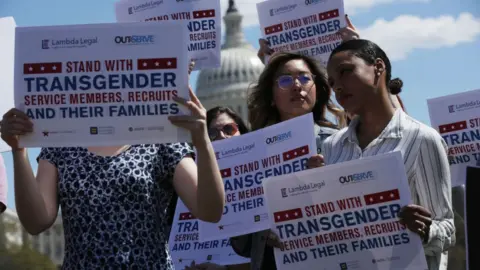Trans US veterans to be offered gender surgery for first time
 Getty Images
Getty ImagesThe US government has announced it will offer gender confirmation surgery for transgender veterans through its health care coverage for the first time.
Department of Veterans Affairs (VA) secretary Denis McDonough announced the change at a Pride event in Florida.
He said it would allow veterans to go through the full process "with VA at their side".
Previously hormone therapy and mental health services were covered but not surgery.
Gender confirmation surgery, also known as sex reassignment surgery, covers a range of procedures which alter a person's anatomy to match their gender identity.
Mr McDonough made the announcement in Orlando on Saturday. The city this month marked five years since a gunman opened fire at a gay nightclub, killing 49 people.
He said the VA would work to overcome a "dark history" of discrimination against trans veterans. A spokesman said the two-year process to start covering the surgeries would begin this summer.
"This time will allow VA to develop capacity to meet the surgical needs that transgender veterans have called for and deserved for a long time... and I am proud to begin the process of delivering it," Mr McDonough said.
He added that VA clinicians recommended the switch in policy, saying the decision "has very real physical health care impacts as well as significant mental health impacts."
The Department of Veterans Affairs provides a range of health care to those eligible, including routine care, hospital services like kidney dialysis, surgery and organ transplants, and emergency care. However, it says some services are not covered, including abortion and cosmetic surgeries.
The National Center for Transgender Equality quotes a widely cited estimate that there are more than 134,000 trans US veterans, and some 15,000 trans people currently serving in the US armed forces, but research for the US Department of Defense in 2016 put the numbers lower.
Former President Donald Trump banned trans Americans from serving in the military in his first year in office. President Joe Biden repealed the ban in January.

